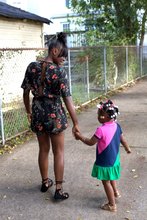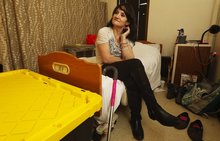0
Publication
Community:
Jan 24, 2019
Affordable housing campaigns are not new, of course, but what is unprecedented and transformative about Opportunity Starts at Home is the scope and diversity of the partners that are joining forces to advocate for more robust and equitable federal housing policies. The campaign is advised by a Steering Committee including leading national organizations representing a wide range of interests that are working shoulder-to-shoulder to solve the affordable housing crisis.
Authored by: Opportunity Starts at Home
Topics: Asset building, Child welfare, CLPHA, Community development, Early childhood, Education, Food insecurity, Funding, Health, Homelessness, Housing, Immigrants, Legislation & Policy, Low-income, Mobility, Out-of-school time, Partnerships, Racial inequalities, Safety, Seniors, Stability, Substance abuse, Youth
 Shared by Mica O'Brien
Shared by Mica O'Brien
Mica O'Brien posted a
on Jan 24, 2019
Opportunity Starts at Home
Affordable housing campaigns are not new, of course, but what is unprecedented and transformative about Opportunity Starts at Home is the scope and diversity of the partners that are joining forces to advocate for more robust and equitable federal housing policies.
0
Publication
Community:
Quality affordable housing can be a “vaccine” which prevents long-term health problems and promotes healthy, productive lives. When a family’s housing situation is unaffordable and unstable, chances to lead a healthy life dwindle rapidly.
Authored by: Opportunity Starts at Home
Topics: Child welfare, Health, Homelessness, Housing, Low-income, Partnerships, Seniors, Stability
 Shared by Mica O'Brien
Shared by Mica O'Brien
Mica O'Brien posted a
on Jan 18, 2019
Opportunity Starts at Home
Quality affordable housing can be a “vaccine” which prevents long-term health problems and promotes healthy, productive lives. When a family’s housing situation is unaffordable and unstable, chances to lead a healthy life dwindle rapidly.
0
News Article
Community:
Jan 14, 2019
The San Jose Unified School District has its own plan: raze aging school buildings, send their students to new facilities, and turn that land into affordable rental housing for at least 300 teachers and school workers.
Authored by: Dana Goldstein for The New York Times
Topics: Education, Housing, Low-income, Partnerships, Stability, West Coast
 Shared by Mica O'Brien
Shared by Mica O'Brien
Mica O'Brien posted a
on Jan 17, 2019
Dana Goldstein for The New York Times
The San Jose Unified School District has its own plan: raze aging school buildings, send their students to new facilities, and turn that land into affordable rental housing for at least 300 teachers and school workers.
0
News Article
Community:
Jan 16, 2019
In 2018, over half a million people experienced homelessness on a given night in the US. Of those, roughly one in three experienced unsheltered homelessness in a car, outside, or in other places not meant for human habitation.
Authored by: Aaron Shroyer How Housing Matters
Topics: Homelessness, Housing, Low-income, Stability, Supportive housing
 Shared by Housing Is
Shared by Housing Is
Housing Is posted a
on Jan 17, 2019
Aaron Shroyer How Housing Matters
In 2018, over half a million people experienced homelessness on a given night in the US. Of those, roughly one in three experienced unsheltered homelessness in a car, outside, or in other places not meant for human habitation.
0
Publication
Community:
Oct 9, 2018
Women with children, especially, stay hidden in fear of losing custody of their children. As a result, we will never see them camping in tents or in downtown parks.
Authored by: Mary Ellen Mitchell for SchoolHouse Connection
Topics: Early childhood, Homelessness, Housing, Legislation & Policy, Low-income, Safety, Stability
 Shared by Mica O'Brien
Shared by Mica O'Brien
Mica O'Brien posted a
on Jan 11, 2019
Mary Ellen Mitchell for SchoolHouse Connection
Women with children, especially, stay hidden in fear of losing custody of their children. As a result, we will never see them camping in tents or in downtown parks.
0
News Article
Community:
Jan 10, 2019
Island School is one of 247 “community schools” in New York. These are regular public schools, with a twist. They have longer days and longer school years: Island stays open 12 hours a day, six days a week, including spring and winter breaks as well as the summer. A psychologist makes weekly rounds. A dentist comes by regularly. So does an optometrist, and students who need glasses get them free.
Authored by: David L. Kirk for The New York Times
Topics: Community development, Dual-generation, East Coast, Education, Family engagement, Homelessness, Housing, Low-income, Mental health, Metrics, Partnerships, Stability, Youth
 Shared by Mica O'Brien
Shared by Mica O'Brien
Mica O'Brien posted a
on Jan 10, 2019
David L. Kirk for The New York Times
Island School is one of 247 “community schools” in New York. These are regular public schools, with a twist. They have longer days and longer school years: Island stays open 12 hours a day, six days a week, including spring and winter breaks as well as the summer.
0
News Article
Community:
Dec 24, 2018
When homeless people get released, their issues combined with living on the street will usually land them back in emergency rooms, costing hospitals like Harborview Medical Center — which operates on a thin margin — time and money. One solution is a type of respite program that provides short-term care to homeless patients who are too sick to be on the streets or in a shelter, but not sick enough to continue to take up a hospital bed.
Authored by: Scott Greenstone for The Seattle Times
Topics: Health, Homelessness, Housing, Pacific Northwest, Partnerships, Place-based, Preventative care, Stability
 Shared by Mica O'Brien
Shared by Mica O'Brien
Mica O'Brien posted a
on Jan 7, 2019
Scott Greenstone for The Seattle Times
When homeless people get released, their issues combined with living on the street will usually land them back in emergency rooms, costing hospitals like Harborview Medical Center — which operates on a thin margin — time and money.
0
Interactive
Community:
A building-level interactive map that shows where residential tenants face displacement pressure and affordable apartments are threatened across New York City. Monthly reports on new harassment and displacement risk in rent-stabilized buildings by Community District and color-coded by risk factors.
Authored by: Association for Neighborhood & Housing Development
Topics: East Coast, Housing, Low-income, Stability
 Shared by Mica O'Brien
Shared by Mica O'Brien
Mica O'Brien posted a
on Dec 21, 2018
Association for Neighborhood & Housing Development
A building-level interactive map that shows where residential tenants face displacement pressure and affordable apartments are threatened across New York City. Monthly reports on new harassment and displacement risk in rent-stabilized buildings by Community District and color-coded by risk factors.
0
Publication
Community:
Apr 10, 2018
State and local governments are debating and adopting new landlord-tenant laws and pilot programs, such as expanded legal representation and just-cause eviction requirements. Yet, few housing experts understand evictions well enough to channel the demand for change into clarity about specific eviction problems and potential solutions. Now is the time for policymakers and advocates to get smart. Here are five strategies for policymakers to consider as they address America’s eviction crisis.
Authored by: Maya Brennan for Urban Institute
Topics: Housing, Legislation & Policy, Low-income, Research, Stability
 Shared by Mica O'Brien
Shared by Mica O'Brien
Mica O'Brien posted a
on Dec 21, 2018
Maya Brennan for Urban Institute
State and local governments are debating and adopting new landlord-tenant laws and pilot programs, such as expanded legal representation and just-cause eviction requirements.
0
Publication
Community:
Oct 1, 2016
This report examines strategies used by local governments to address rising housing costs and displacement of low-income households in gentrifying neighborhoods. To assist tenants at risk of displacement, the report details strategies to regulate the landlord/tenant relationship well as strategies to provide assistance for households that move. To create and preserve affordable housing, the report explores ways to use city-owned land and other resources strategically to promote affordable housing in areas where costs are on the rise. It also examines ways to harness the market, such as inclusionary zoning and linkage fees. The report is part of an ongoing series of work by the NYU Furman Center on gentrification, but is the first to provide an overview of policy responses to the effects rapidly rising rents.
Authored by: Jessica Yager, Luke Herrine, and Nadia Mian for NYU Furman Center
Topics: Community development, Housing, Low-income, Stability
 Shared by Mica O'Brien
Shared by Mica O'Brien
Mica O'Brien posted a
on Dec 21, 2018
Jessica Yager, Luke Herrine, and Nadia Mian for NYU Furman Center
This report examines strategies used by local governments to address rising housing costs and displacement of low-income households in gentrifying neighborhoods.
0
Publication
Community:
Dec 1, 2018
New York City’s UAC has generated substantial interest as other jurisdictions across the U.S. consider or implement similar programs. In June 2018, San Francisco voters approved a ballot initiative requiring the city to establish, fund, and run a program to provide legal representation to all tenants facing eviction regardless of income. The Los Angeles City Council approved a motion in August 2018 instructing the housing department to develop recommendations for a new eviction defense bill or program.
Authored by: Vicki Been, Deborah Rand, Nicole Summers, and Jessica Yager for NYU Furman Center
Topics: Housing, Legislation & Policy, Low-income, Stability
 Shared by Mica O'Brien
Shared by Mica O'Brien
Mica O'Brien posted a
on Dec 21, 2018
Vicki Been, Deborah Rand, Nicole Summers, and Jessica Yager for NYU Furman Center
New York City’s UAC has generated substantial interest as other jurisdictions across the U.S. consider or implement similar programs.
0
Research
Community:
Aug 19, 2018
On the 50th anniversary of the Fair Housing Act, there is growing discussion and concern about gentrification. In almost every American city, long-time residents feel increasingly
anxious that they will be priced out of their homes and communities, as growing numbers of higher-income, college-educated households opt for downtown neighborhoods. Yet when looking through the lens of fair housing, gentrification also offers a glimmer of hope, as the moves that higher-income, white households make into predominantly minority,
lower-income neighborhoods are moves that help to integrate those neighborhoods, at least in the near-term. The key question is whether this integration will last and help to deliver on the promise of the Fair Housing Act to promote and further integrated living. Inverting the famous words of community organizer Saul Alinsky, this integration may only be the time between when the first white moves in and the last family of color moves out.
Authored by: Ingrid Gould Ellen and Gerard Torrats-Espinosa for NYU Furman Center
Topics: Community development, Housing, Low-income, Mobility, Racial inequalities, Research, Stability
 Shared by Mica O'Brien
Shared by Mica O'Brien
Mica O'Brien posted a
on Dec 19, 2018
Ingrid Gould Ellen and Gerard Torrats-Espinosa for NYU Furman Center
On the 50th anniversary of the Fair Housing Act, there is growing discussion and concern about gentrification.
0
Webinar
Community:
Dec 11, 2018
CLPHA’s Education Working Group hosts a webinar including presentations on efforts from the Chicago Housing Authority to work with residents on pursuing postsecondary opportunities, as well as an update from HUD’s Office of Policy Development & Research on data collection around tracking and increasing FAFSA utilization.
Authored by: CLPHA
Topics: CLPHA, Cost effectiveness, Data sharing, Education, Funding, Housing, Housing Is Working Group, Low-income, Metrics, Midwest, Post-secondary, Research, Stability, Youth
 Shared by Mica O'Brien
Shared by Mica O'Brien
Mica O'Brien posted a
on Dec 12, 2018
CLPHA’s Education Working Group hosts a webinar including presentations on efforts from the Chicago Housing Authority to work with residents on pursuing postsecondary opportunities, as well as an update from HUD’s Office of Policy Development & Research on data collection around tracking and inc
0
News Article
Community:
Dec 12, 2018
Lily, a character introduced seven years ago to address child hunger, returns. This time her family does not have a place to live.
Authored by: Nikita Stewart for The New York Times
Topics: Child welfare, Education, Homelessness, Housing, Stability, Youth
 Shared by Mica O'Brien
Shared by Mica O'Brien
Mica O'Brien posted a
on Dec 12, 2018
Nikita Stewart for The New York Times
Lily, a character introduced seven years ago to address child hunger, returns. This time her family does not have a place to live.
0
News Article
Community:
Dec 10, 2018
As state and federal officials increasingly search for ways to curb rising health care costs, a decades-old idea is gaining traction: helping people with challenges that have nothing to do with medical care but everything to do with their health.
Authored by: Misty Williams for Roll Call
Topics: Cost effectiveness, Food insecurity, Health, Homelessness, Housing, Low-income, Medicaid / Medicare, Nutrition, Partnerships, Preventative care, Stability, Transportation
 Shared by Mica O'Brien
Shared by Mica O'Brien
Mica O'Brien posted a
on Dec 10, 2018
Misty Williams for Roll Call
As state and federal officials increasingly search for ways to curb rising health care costs, a decades-old idea is gaining traction: helping people with challenges that have nothing to do with medical care but everything to do with their health.
0
Publication
Community:
Dec 1, 2018
With collectively more than 100 years of policy expertise and values-based leadership between us, Ascend at the Aspen Institute and the Housing Opportunity and Services Together initiative at the Urban Institute partnered to develop a set of recommendations on how to harness assisted housing and public-private housing partnerships for better outcomes for families.
Authored by: The Urban Institute and ASCEND: The Aspen Institute
Topics: Dual-generation, Early childhood, Education, Family engagement, Health, Housing, Low-income, Place-based, Research, Stability
 Shared by Mica O'Brien
Shared by Mica O'Brien
Mica O'Brien posted a
on Dec 6, 2018
The Urban Institute and ASCEND: The Aspen Institute
With collectively more than 100 years of policy expertise and values-based leadership between us, Ascend at the Aspen Institute and the Housing Opportunity and Services Together initiative at the Urban Institute partnered to develop a set of recommendations on how to harness assisted housing and pub
0
News Article
Community:
Nov 30, 2018
The city and county of Durham, GoTriangle and the Durham Housing Authority are committed to enhancing opportunities for existing low-income families as well as to increasing the production of affordable housing. The light-rail project is critical to the success of these goals, and the success of these goals is critical to the light-rail project.
Authored by: Anthony Scott and John Tallmadge for The Herald Sun
Topics: Community development, Funding, Housing, Legislation & Policy, Low-income, Partnerships, South, Stability, Transportation
 Shared by Mica O'Brien
Shared by Mica O'Brien
Mica O'Brien posted a
on Dec 3, 2018
Anthony Scott and John Tallmadge for The Herald Sun
The city and county of Durham, GoTriangle and the Durham Housing Authority are committed to enhancing opportunities for existing low-income families as well as to increasing the production of affordable housing.
0
Publication
Community:
Nov 28, 2018
Housing instability among families and children can be detrimental to child welfare, health, economic, and other outcomes. Policymakers and service providers in these fields should consider weaving housing into their approaches. Treating instability at its roots can relieve the trade-offs and stress that emerge when no decent housing is affordable. Evidence indicates that affordable housing can improve a range of outcomes for families and—in combination with short-term or long-term services—help providers tackle complex challenges head-on.
Authored by: Aaron Shroyer for The Urban Institute
Topics: Child welfare, Family engagement, Housing, Low-income, Stability, Supportive housing
 Shared by Mica O'Brien
Shared by Mica O'Brien
Mica O'Brien posted a
on Nov 29, 2018
Aaron Shroyer for The Urban Institute
Housing instability among families and children can be detrimental to child welfare, health, economic, and other outcomes. Policymakers and service providers in these fields should consider weaving housing into their approaches.
0
Report
Community:
Mar 14, 2018
There were 33,889 homeless schoolchildren in Florida during the 2007–08 school year, including children temporarily doubled up with others and children staying in hotels, motels, shelters, transitional housing, and unsheltered locations. By the 2015–16 school year, that number had risen to 72,601. This report suggests that the rise is because of the recession and foreclosure crisis, the state’s increasing shortage of affordable housing, and school districts training teachers, counselors, and other staff to identify students with no permanent housing.
Authored by: The Shimberg Center for Housing Studies and Miami Homes for All
Topics: Data sharing, Education, Homelessness, Housing, Low-income, Research, South, Stability, Youth
 Shared by Mica O'Brien
Shared by Mica O'Brien
Mica O'Brien posted a
on Nov 21, 2018
The Shimberg Center for Housing Studies and Miami Homes for All
There were 33,889 homeless schoolchildren in Florida during the 2007–08 school year, including children temporarily doubled up with others and children staying in hotels, motels, shelters, transitional housing, and unsheltered locations. By the 2015–16 school year, that number had risen to 72,601.
0
Research
Community:
May 16, 2018
Treating opioid use disorder among homeless families can reduce hepatitis C transmission, infant drug withdrawal, and overdose, which is the leading cause of death among people experiencing homelessness. Although office-based treatment is effective for homeless patients, homelessness (especially among families) creates barriers to office-based opioid treatment, such as stigma, child care needs, or distance from an office site. To reduce barriers to treatment, the Family Team at the Boston Health Care for the Homeless Program added a shelter-based opioid treatment program to its outreach clinic at a family homeless shelter and motel. The Family Team consists of a physician, a nurse, two case managers, and a behavioral health clinician.
Authored by: American Public Health Association
Topics: Health, Homelessness, Housing, Place-based, Preventative care, Safety, Stability, Substance abuse
 Shared by Mica O'Brien
Shared by Mica O'Brien
Mica O'Brien posted a
on Nov 21, 2018
American Public Health Association
Treating opioid use disorder among homeless families can reduce hepatitis C transmission, infant drug withdrawal, and overdose, which is the leading cause of death among people experiencing homelessness.
0
Report
Community:
Oct 3, 2018
More than a third of homeless people are part of a family, most of which are headed by women with at least one child. Homeless families are different from single homeless people, and their needs differ. But limited research focuses on these families. This study aims to fill the gap by exploring longitudinal health service use and expenditures for homeless family members before and after entering an emergency shelter.
Authored by: Robin Clark, Linda Weinreb, Julie Flahive, and Robert Seifert for the American Journal of Public Health
Topics: Family engagement, Health, Homelessness, Housing, Low-income, Preventative care, Research, Stability
 Shared by Mica O'Brien
Shared by Mica O'Brien
Mica O'Brien posted a
on Nov 21, 2018
Robin Clark, Linda Weinreb, Julie Flahive, and Robert Seifert for the American Journal of Public Health
More than a third of homeless people are part of a family, most of which are headed by women with at least one child. Homeless families are different from single homeless people, and their needs differ. But limited research focuses on these families.
0
Publication
Community:
Nov 20, 2018
People with mental health disabilities are vastly overrepresented in the population of people who experience homelessness. Of the more than 550,000 people in America who experienced homelessness on a given night in 2017, 1 in 5 had a mental illness. The proportion of people experiencing chronic homelessness with mental health disabilities was even higher—nearly 1 in 3. Despite this fact, the reality is that most people with mental illness fortunately do not experience homelessness: While about 20 percent of all adults in the United States have a mental illness, less than two-tenths of 1 percent of people in the country experienced homelessness on a given night in 2017.
Authored by: Heidi Schultheis for Center for American Progress
Topics: Depression, Disabilities, Homelessness, Housing, Legislation & Policy, Low-income, Mental health, Partnerships, Preventative care, Stability, Substance abuse, Supportive housing
 Shared by Mica O'Brien
Shared by Mica O'Brien
Mica O'Brien posted a
on Nov 20, 2018
Heidi Schultheis for Center for American Progress
People with mental health disabilities are vastly overrepresented in the population of people who experience homelessness. Of the more than 550,000 people in America who experienced homelessness on a given night in 2017, 1 in 5 had a mental illness.
0
Interactive
Community:
Nov 14, 2018
After decades of sprawl and suburban dominance, U.S. cities are experiencing rebounding populations, growing employment, and new public and private sector investments in places that are walkable, transit-oriented, and support diverse people and amenities. But we know that the benefits of these trends are not equally distributed, presenting an urgent opportunity for local and regional leaders to advance place-led development that produces better economic outcomes for more people in more places.
To help deliver on that imperative, the Metropolitan Policy Program at Brookings launched the Anne T. and Robert M. Bass Center for Transformative Placemaking (“Bass Center”) with an event on Wednesday, November 14. In collaboration with Project for Public Spaces (PPS) and the National Main Street Center (NMSC), the Bass Center will inspire public, private, and civic sector leaders to make transformative place investments that generate widespread social and economic benefits. Brookings President John Allen, Bass Center Director and Senior Fellow Jennifer Vey, special guest speaker Carol Coletta, and a distinguished panel of experts discussed how market and demographic trends are driving new demands for placemaking that benefit more people and places.
Authored by: The Brookings Institution
Topics: Community development, Housing, Partnerships, Place-based, Safety, Stability
 Shared by Mica O'Brien
Shared by Mica O'Brien
Mica O'Brien posted a
on Nov 19, 2018
The Brookings Institution
After decades of sprawl and suburban dominance, U.S. cities are experiencing rebounding populations, growing employment, and new public and private sector investments in places that are walkable, transit-oriented, and support diverse people and amenities.
0
Research
Community:
Nov 1, 2018
Are families prioritizing their housing payments by jeopardizing their health and well-being, missing utility payments, skipping meals, or failing to keep up with medical needs or medical bills? And are renters less able than homeowners to weather a financial emergency, such as an unexpected medical expense? Our research suggests this may be the case.
Authored by: Corianne Scally and Dulce Gonzalez for The Urban Institute
Topics: Asset building, Child welfare, Food insecurity, Health, Homelessness, Housing, Low-income, Research, Stability
 Shared by Mica O'Brien
Shared by Mica O'Brien
Mica O'Brien posted a
on Nov 7, 2018
Corianne Scally and Dulce Gonzalez for The Urban Institute
Are families prioritizing their housing payments by jeopardizing their health and well-being, missing utility payments, skipping meals, or failing to keep up with medical needs or medical bills?
0
Research
Community:
Oct 16, 2018
The evidence on how homelessness affects children suggests policymakers should be doing everything possible to prevent homelessness and, when families who do lose their housing, to help them exit homelessness and stabilize in housing quickly. Rapid re-housing (RRH) can help homeless families in crisis.
Authored by: Mary K. Cunningham for The Urban Institute
Topics: Child welfare, Health, Homelessness, Housing, Legislation & Policy, Low-income, Research, Stability
 Shared by Mica O'Brien
Shared by Mica O'Brien
Mica O'Brien posted a
on Nov 5, 2018
Mary K. Cunningham for The Urban Institute
The evidence on how homelessness affects children suggests policymakers should be doing everything possible to prevent homelessness and, when families who do lose their housing, to help them exit homelessness and stabilize in housing quickly.
 Shared by Housing Is
on Jan 17, 2019
Shared by Housing Is
on Jan 17, 2019















